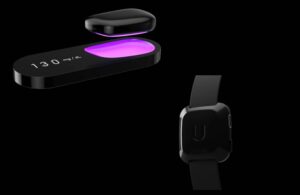
The company titled its study “Technical Feasibility of a Novel Sensor for Non-Invasive Blood Glucose Monitoring Compared to Dexcom G6.” It’s presenting results today at the American Association of Clinical Endocrinology (AACE) Annual Meeting in Seattle.
Know Labs conducted a series of internal studies between December 2022 and February 2023. The company sought to validate the technical feasibility of its Bio-RFID sensor technology for quantifying blood glucose concentration (BGC). Its studies evaluated five healthy participants using the Dexcom G6 as a reference device.
The company’s proprietary Bio-RFID technology uses spectroscopy to direct electromagnetic energy through a substance or material. Through this, it can capture a unique molecular signature. The Know Labs technology integrates into wearable, mobile or bench-top form factors.
Know Labs wanted to use the study to demonstrate hardware and software infrastructure stability. It also aimed to collect additional data to determine the accuracy of the sensor in quantifying BGC in vivo non-invasively using radiofrequency. The study used a neural network model to predict readings of the Dexcom G6 as a proxy for BGC.
This marks the latest study to back the Know Labs Bio-RFID technology, following data presented last month.
About the data from Know Labs
Participants placed their forearms on the Bio-RFID sensor and consumed liquid D-Glucose to stimulate a glucose spike. The study monitored BGC for three hours while simultaneously logging readings from the Bio-RFID sensor and the Dexcom G6. It collected data on a continuous basis.
Know Labs then used the data from the Bio-RFID sensor to train the neural network model to predict the readings.
Across five participants, 46 tests and 92 samples, the study collected 4.7 million data points per sample. That amounted to roughly 430 million data points for all samples.
Know Labs said its study resulted in a mean absolute relative difference (MARD) of 20.6%. It performed with 46% of predictions within the FDA’s recommended limit for accuracy for new blood glucose monitors.
Steve Kent, chief product officer at Know Labs, said the foundational studies demonstrate “a stable sensor that delivers repeatable results.” He added that the company has a software infrastructure capable of managing and interpreting large, novel datasets. Know Labs aims to continue to gather more high-resolution data from more participants across more scenarios, Kent said.
“Today’s methods of testing BGC come with several disadvantages, from the pain of finger pricks and inserting probes for continuous monitors to the high cost and environmental waste these methods produce,” said Ron Erickson, CEO and chair at Know Labs. “This study demonstrates our progress toward getting the first FDA-cleared non-invasive glucose monitoring device in the hands of the nearly 40 million people living with diabetes in the U.S. We’ve achieved so much over the last several months.
“We’ve refined data collection methods and increased our participant population, with our dataset growing from 3 in our exploratory study to 92 in this study, a 30-fold increase in the sample size. To-date, we’ve collected 1.4 billion data points that are now being used to refine our glucose value prediction algorithm.”

